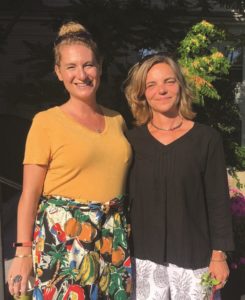PROVINCETOWN — The Outer Cape’s health agents’ duties range from enforcing food and water safety to supporting emotional connection. Their jobs touch on sex, rats, and sewers. And that was before Covid-19 put them at the center of our economic and personal space issues.
In a normal year, agents focus on food, water, housing, and wastewater. In Truro and Wellfleet, water and wastewater are so central to the job that the health and conservation departments are merged.
“Most of Truro is on private wells, and we supply municipal water for Provincetown,” said Truro Health Agent Emily Beebe. “Protecting that lens of groundwater is our responsibility. We don’t have a public sewer system, so we spend a lot of time working with septic systems as well.”
In any given week, Beebe might work with runoff models for a large roadway, septic calculations for a new kitchen or bedroom, water quality tests for the beach department, and a private home owner worried about her well. She checks restaurants for food storage and cleanliness, and farms, too.
“Truro has a surprising number of farms,” said Beebe. “Goats, chickens, horses, pigs, a couple of cows, turkeys, ducks. And guinea fowl.”
Safe housing is another major responsibility. In Eastham, rental properties have been on a certification and inspection program for years.
“In most years,” said Eastham Director of Health and Environment Jane Crowley, “we have about 1,100 rental properties registered. We have a rotating system of inspections — we do about 300 seasonal, year-round, and short-term rental properties a year.”
Inspectors look for fire and carbon monoxide detectors, unobstructed fire exits, and unsafe wiring. They establish the safe occupancy number for the property, so if a complaint about overcrowding comes in, they already know how many people should be there.
The Wellfleet Board of Health is considering a similar program. “We’re looking at a self-certification program, like Provincetown has, but with a few more questions about wells and septics,” said Health Agent Hillary Greenberg-Lemos. A public hearing on this topic is scheduled for June 10 at 1 p.m. For call-in information, see the town’s website.

Community connection, mental health, and substance abuse are priorities for Provincetown’s health department. The “Winter Wednesdays” learning workshops were developed to help fight social isolation in the dark months. Yoga for Addiction Recovery, the Breastfeeding Support Program, and the Provincetown Crop Swap are initiatives that Health Director Morgan Clark said were especially meaningful to her.
Now that the departments are involved in making critical decisions about how and when to reopen businesses, how to manage humans’ innate tendency to congregate, and how to ensure help still gets to those who need it, Clark says she misses putting her all into those programs.
“What kills me is, I’m not able to spend more time trying to support community and connection and mental health,” Clark said. “We’re doing population models, we’re building a health dashboard to track local Covid metrics. This virus strikes right at our social resources. Talking to people, exercising, singing, these are the ways we connect. On the street, with a mask on, you can’t see someone smile.
“My new role in public health is to be telling the world how dangerous singing is,” Clark added. “There’s no safe way to sing indoors. That hurts my heart.”



